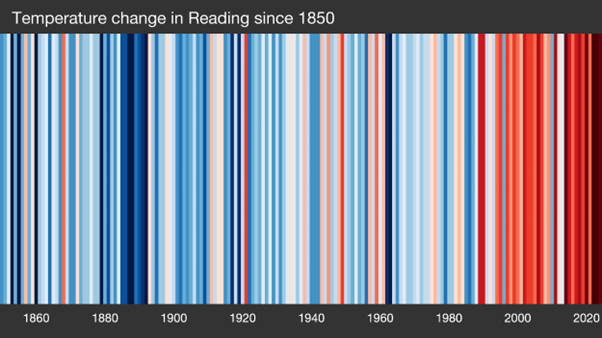Professor Ed Hawkins is one of Europe’s foremost climate scientists. During a recent visit to the Met Office in Exeter in the UK, ASPECT’s Grahame Madge asked him about climate change in Europe and how fast changes are happening across the continent compared with other regions of the world.
Professor Hawkins, of the University of Reading, said: “So the UK and Europe more generally is warming faster than the global average and that’s partly because land areas warm faster than oceans but also Europe is quite close to the Arctic and the Arctic is warming very rapidly, and so some of that extra heat is also impacting Europe as well.
“We’re already seeing lots of changes in extreme weather. We’re seeing increased heat waves. We’re seeing increased rainfall intensity from heavy rainfall events. And these changes are just going to get worse and worse as the climate continues to warm.”
Europe is known for its long history of weather observations and Professor Hawkins is a renowned expert in digitising older weather observations and incorporating them within the archive. He said: “We’ve measured the weather in the UK and Europe for a very long time indeed, a couple of centuries or more in many places, so we’ve got a wealth of information about changes in temperature, about changes rainfall, sunshine amounts, all of these things have been measured in quite a lot of detail for many decades.”
Looking to the future of Europe’s climate, Ed is very keen to stress the importance of having seamless climate information to assess the changes which will take place in Europe’s climate from seasonal to decadal timescales – such as that being provided by the ASPECT project. He added: “We need to understand how the climate is going to change over the coming decades so we can make the correct decisions about how to adapt and how to mitigate those changes. So yes, having this seamless information is really important.
“As our weather becomes more extreme, we’re going to need to adapt to the changes we’re seeing. We’re going to need to learn how to deal with hotter heatwaves, heavier rainfall, so that we don’t get so much flooding, for example. So we’re gonna feel climate change through the extreme events that we see and we need to adapt and deal with the consequences of those.”
Ed Hawkins is most well-known for the development of climate stripes, where metrics such as the annual temperature or rainfall can be colour-coded for each year depending on how far from average it has been. Commenting on the contribution that the climate stripes have made to the public understanding of our changing climate, he said: “We need a whole range of ways of communicating. We need to communicate visually, simply in many cases, but also to have more complex ways as well for those who want the more detailed information. We need images, we need words, we need stories about how climate change is affecting us.
“The climate stripes can make people aware of what’s happening, what we are doing to the climate by burning fossil fuels, we are changing temperatures, increasing heavy rainfall events, and we are being affected by that, and so by ensuring people understand that, it can motivate choices about what we do next.
“The climate stripes are brilliant at communicating very simply. One glance at the image allows anyone to understand what’s happened to the temperature wherever they happen to live. And it’s proved to be immensely valuable for communicating simply and to broad audiences. It’s been adapted and used by so many different people to create stories and tell the message about what we’re doing to our planet.”

“It’s amazing to see how people have taken this idea and used it to create conversations, start conversations about how climate change is affecting us. And it’s brilliant to see the diverse audiences which have seen it. So, Reading Football Club have had it on their kit, for example, for a season; starting conversations in the stands about climate change during a football match. It’s amazing to see how far it’s gone.”
This year’s Show Your Stripes Day takes place on 21 June 2025
LinkedIn
Ed Hawkins https://www.linkedin.com/in/edhawkinsclimate/
University of Reading https://www.linkedin.com/school/university-of-reading/
BlueSky
Ed Hawkins https://bsky.app/profile/edhawkins.org
University of Reading https://bsky.app/profile/uniofreading.bsky.social
X University of Reading @UniofReading